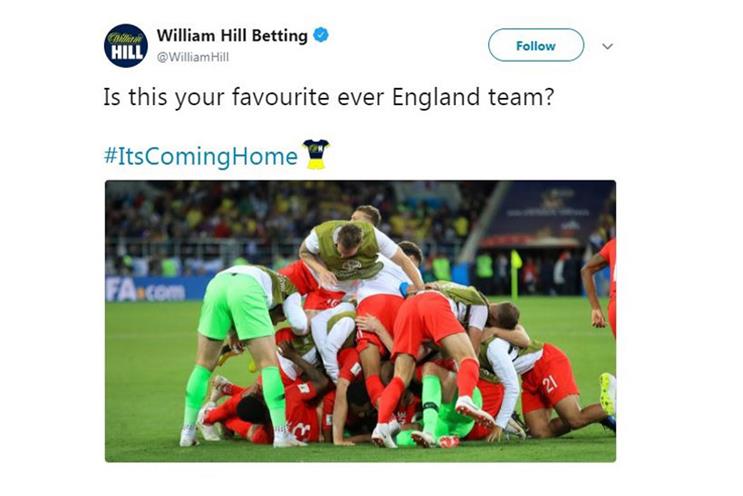So… it might actually be coming home.
Maybe it’s the heat. Maybe it’s the pick ‘n’ mix political climate. Whatever it is, we’ve all been brought together by three lions on a shirt and Jules Rimet still gleaming.
It’s a bizarre sense of national pride seldom seen on such a widespread, near-unanimous scale in England. In 2018, where the nation’s pulling itself apart over Brexit, it’s something to be cherished.
Instead, it’s been exploited.
Hashtags are currency, and William Hill knows a thing or two about that.
The bookmaker has taken #ItsComingHome - to quote The Lightning Seeds’ 1996 football anthem, Three Lions – and integrated it within its promoted trends and First View Twitter promotion. This is set to last the duration of the tournament. As a result, fans sharing the hashtag have also unintentionally shared a football shirt emoji bearing the William Hill logo.
Wait. What?
William Hill, the bookmaker? William Hill, with the Twitter account clearly stating ‘18+ ’?
That doesn’t seem very… aware.
If Budweiser did that with a beer emoji, it’d be crucified.
Not because it’s hijacking popular culture; badge-kissing in the most banal, trite fashion.
Because it’s immoral. Users over and under 18 are inadvertently being exposed to gambling, when all they’re trying to do is express camaraderie by way of a novelty song. It’s shameless. Sneaky. Hopelessly unregulated.
Brands pulling a fast one, seemingly without consequence, actually damage trust. But the blame doesn’t just fall on William Hill.
It’s that little blue bird’s fault, too. How did Twitter think this was appropriate? Did it fail to see that it might be condoning gambling among football fans?
A source at the social network insisted the emoji has been used in conjunction with #ItsComingHome since the World Cup started, and that William Hill hadn’t co-opted the hashtag after it went viral. Even if this is the case, the responsible thing to do would be to discontinue the campaign. To quash the irresponsible, widespread sharing of what is essentially adult content. But that wouldn’t be good for Twitter or William Hill, would it? So they did nothing.
If this goes unchecked, people are likely going to trust brands and social media even less than they already do. In light of Facebook’s Cambridge Analytica scandal and the apparently endless stream of inappropriate ads being served on YouTube, it’s vital that brands connect with consumers via genuine, meaningful interactions.
Social media is one of the best mediums for this - it can seamlessly connect physical and digital, allowing people to share what actually matters to them, what actually affects them. In turn, brands can cater to those needs. They can build relationships. Share relevant, fun, engaging content with people who actually want it.
If people don’t trust brands, this method isn’t viable. If people don’t trust social media, this method isn’t viable. Without trust, the entire ecosystem crumbles.
Football fans really care about the World Cup; William Hill and Twitter have exploited that goodwill. People are actively misspelling ‘It’s Coming Home’ to avoid the promotion. Surely that tells you everything you need to know about this sorry state of affairs.
Neil Davidson is managing director at Hey Human


